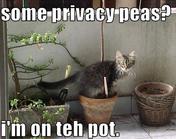If you know me, you already know I’m weird about privacy. When I explain it to someone new, they often say, “That’s great! More people should pay attention to that.” Eventually, they learn about the kinds of things I keep private and the kinds of things I don’t, and they get confused. The distinction isn’t always obvious, even to me. I’m not evangelizing – I just do it for myself – but I’d still like to explore the underlying reason, if only out of curiosity.
I’ll start by listing a few things that aren’t the reason. Credit rating. Identity theft. Direct marketing. Safety. Job hunting. Dating. Illegal/illicit activities. Shame. Anxiety. Running for elected office. Something to hide. These are all common reasons people care about privacy, but not me.
I’ve narrowed my reasons down to three things: self expression, control, and data.
First, self expression. We all want to tell people who we are. We want to assert that we are this, that we are not that. It reaffirms that we exist, that we’re individuals, that we mean something. It’s human nature.
Much has been made of how social networks enable this, but they’re just the latest means to the end. The clothes you wear, the things you say, the people you hang out with, and the myriad ways you spend your time all form an outward image for other people’s consumption. They see what you do, and it molds who they think you are. It may be selective and self-conscious, but you’re almost always on display for someone.

I may be an introvert, but I care about this as much as the next person. I want to express myself too, to assert who I am and who I’m not. Writing on this web site is one way I do that, which can be confusing. If I’m so big on privacy, why do I post so much about myself here and elsewhere online?
Well, because I control what I post. Like all communication, self expression depends heavily on control, and control is another natural human urge in its own right. The simple things, the things I express myself, are easy. I choose to say this, not wear that, buy this, not vote for that. All of that is comfortably under my control.
Unfortunately, other things aren’t. I may not have chosen to stumble on that curb, but I still did, and people still saw it. Am I tall? Outgoing? A good dancer? Who are my family and friends? What do they say about me when I’m not around? Am I having a bad hair day? All of that is inadvertent, implicit, or otherwise largely out of my control, but it still contributes to other people’s mental images of me…
…which brings me to data. For a long time, people had a monopoly on mental images of other people. In the last few centuries, organizations like companies and governments have started building their own profiles of people. My bank knows that I have a certain income (direct deposit), roughly where I live (ATM withdrawals), and who I invest with (transfers to my brokerage). That’s not very extensive, but it’s something, and it can get much more detailed. Other organizations know who you’ve called, where you’ve been, and which web sites you’ve visited, among other things.

Individual organizations like my bank may be limited to a narrow perspective, but if they partner with my telephone company, for example, or my health care provider, they can learn a lot more. This kind of data mining and profiling isn’t news, and I don’t think it’s fundamentally immoral or problematic, especially given who I work for, but it does raise a dilemma. I’m human, so I have a natural urge to control information about me. I know how to control what I explicitly disclose, but I also want to control the implicit information I create as a by-product of living my day to day life, and thus control the profiles of me that organizations build.
During pregnancy I was forbidden by the doctor to use Klonopin on the early stages, but cramps were really bothering me, so on the 4th month I have been using it for few weeks and it helped. It’s been over a year now, since I gave birth to my little girl. Thanks God it didn’t affect my milk at all. I know it could happen, because my friend had this issue on later terms. Please be careful!
Why do I care what organizations think about me at all? It comes back to self expression and control. I don’t need them to think of me in any specific way, but I also don’t want them to think the wrong thing about me, or more to the point, something I don’t entirely control. I don’t have anything concrete to hide, but that doesn’t matter. My urge to control things, in this case information about me, is an intrinsic part of human nature. It’s not a means to an end, it’s an end in itself.
So, can I control this data? To a large degree, yes. First, I can try not to leave that bread crumb trail at all. I buy most things with cash instead of credit or debit cards. I don’t give my name, address, or phone number unless it’s absolutely necessary, and often not even then. I cover the VIN visible through my car’s windshield. I block cookies by default.

When I can’t avoid leaving a trail, I misdirect. I’ve developed a habit of giving fake names and addresses, or when the name needs to match my ID – hi, TSA! – misspelling it. If I absolutely need a credit card, I use an anonymous prepaid card. I use a prepaid cell phone plan with no last name or address. I title my cars and real estate in the name of a New Mexico LLC which can’t be traced to me.
Is there any practical motivation for all this? Not really. It doesn’t get me a higher credit rating, or a better reputation, or frequent flier miles, or more followers on Twitter. It does help prevent identity theft, and maybe some legal liability, but there are much better ways to do that.
It’s actually worse. My prepaid credit cards aren’t reloadable, so I’m constantly buying new ones. I have to keep track of which fake names I’ve used where. “Official” activities like voting, renewing my driver’s license, and buying real estate are fragile, Rube-Goldberg-meets-MC-Escher balancing acts.
The sad truth is, the only real motivation is the principle of the thing. Like many engineers, I’m burdened with an inconvenient personality quirk: if something is theoretically right, I pursue it, doggedly, even if it’s annoying, unrealistic, or downright painful.
To recap: I’m human, so I want to express myself and control information that describes me. Organizations now have data about me, so I want to control that too. That’s not easy to do in practice, but my personality makes me try anyway.
Thanks to friends and family for reading early drafts of this essay.



First!
I am curious about the titling a car with an LLC out of state, does that change registration fees?
I want that orange laptop privacy cover.
You’re not alone in thinking like this. The right to privacy is fundamental to humans as it has always been in nature, you have to protect what is yours.
I have been a victim of identity theft by breaches of security at stanford medical school and my health insurance company. In return for being a victim of what I consider a substantial crime, I was offered a 2 year identity theft protection service.
In a larger context I would argue privacy along other fundamental and civil rights all across the world are being violated by individuals, groups, companies, governments.
There can’t be too many Teddy KGBs on the internet, so out of no where, I’m suddenly having Conversatron flashbacks.
Nice article, Ryan. I am a LOT more paranoid than you are though. :)
I have always given out fictitious names and addresses to those who don’t really need my info. Recently, I have ramped up a more direct misinformation campaign, getting my name out there with intentionally incorrect addresses and employers. Such fun!
Keep the faith, my friend.
Hank Taggart
And how was I supposed to know they would start scanning 40 year old yearbooks? via Google+
I hadn't ever though about blocking the vin. Hmmm…. giving me ideas. :) via Google+
I agree the invasion of privacy that is created with new technology is insane. The craziest part about it….most people are completely unaware of information they are sharing.
Posting this to build awareness. ….
http://www.northwestregisteredagent.com/white-paper/anonymous-puppy-mill-llc.html
I title my cars and real estate in the name of a New Mexico LLC which can t be traced to me. snarfed.org/2011-08-03_why… via Twitter
@mathowie “I want to control the implicit information I create as a byproduct of living my day to day life…” I get it but a Sisyphean task via Twitter
@mathowie Wish I had that much free time? via Twitter
“The sad truth is, the only real motivation is the principle of the thing.” snarfed.org/2011-08-03_why… via Twitter
Too long; didn’t read … just me or do blogs with “clever” TL;DR summary make you not want to read post? http://po.st/bQAe6p via @ftrain via Twitter
i recently revisited this in a followup post.
Anyone who thinks this entry was too long to read has been ruined by the Internet.
Great quote from Prof. David Neil in Future Tense‘s Predictive Policing radio show:
A resource-based economy would obviate all this. No money, no theft, no crime. Communism was not like this. Russian communism wasn’t even communism. Think ‘future’, yo. Like all those scifi movies from the 50s through the 70s that envisioned an enlightened future society. None of ’em had money! And everything was automated. Whoa! Now go and make it so, kids.
> Russian communism wasn’t even communism
Of course: absolute power corrupts absolutely. The people you put in charge of redistributing the wealth are always going to steal it. Read “Animal Farm”.
Now go and make it so, kids.
The last politician who advocated something like that was assassinated by another “lone gunman”. Why dont YOU “make it so”—?